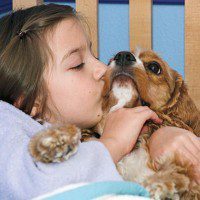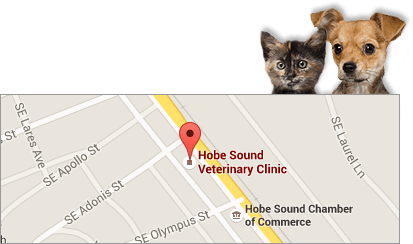Has your little munchkin started asking for a puppy? Are you wondering whether the time is right for a new four-legged, furry family addition? Determining when to get your child their first pet can be a bit tricky. One the one hand, children can reap some great physical and emotional benefits from having a pet. Pets provide playmates, friendship, unconditional love and loyalty, and plenty of cuddles, all of which are wonderful things for a child to experience. On the other hand, getting a pet prematurely can have severe repercussions, both for your family and the puppy. In this article, your vet offers some things to consider when deciding if your child is ready for a canine pal.
Consistent Interest
If your child begs for a puppy one day, and then seems to forget about the request, it may not be time yet. Wait until you start getting steady, repeated requests.
Responsibility
Evaluate your child’s temperament. Does he or she act mature and responsible? You may find some telling signs in day-to-day matters. Does your child need to be reminded constantly to clean his or her room, or finish their homework? If so, you may want to wait a few years.
Empathy
Does your child love animals, and display true empathy for them? Make sure your child understands that puppies are not toys that can be discarded, but living beings with feelings and needs. To help deepen your child’s understanding of how dogs perceive the world, you might want to read “Is Fido Color Blind? Understanding Your Dog’s Eyesight“. This can provide insightful information about how dogs see, enhancing empathy and care.
Scheduling
If your little one is always on the go with sports, scouts, or other activities, he or she simply may not have time to care for a puppy.
Trial Run
It’s always best to start small, with a pet that needs minimal care. Try a virtual pet first. If that works out, consider getting a pocket pet or goldfish, which won’t require as much attention.
Are You Ready?
Are you ready to take over Fido’s care if things go south? The burden of responsibility will be on you if your child loses interest, which unfortunately happens quite often. Giving up the pet will set a bad example: your child should understand that taking on a pet entails keeping that animal for its entire lifespan. This includes regular veterinary visits and essential health care, such as dental check-ups. Learn more about our “Veterinary Dentistry” services to ensure your new puppy maintains good health throughout its life.
Remember, the love of a pet is a truly beautiful gift, but it can only be given by the animal.
Our Advice on Whether Your Child Is Ready for a Puppy
What is the ideal age range for a child to get their first puppy?
The ideal age for a child to get their first puppy largely depends on the child’s maturity, responsibility, and ability to show consistent interest and empathy towards animals. Typically, children who are at least 6 to 10 years old may be better prepared to handle the responsibilities of pet care under parental supervision. At this age, they can understand and fulfill basic pet care duties, participate in training, and develop a strong bond with the puppy, all while learning about the commitment required to take care of another living being.
How can parents assess their child’s ability to handle the physical aspects of pet care?
Parents can assess their child’s ability to handle the physical aspects of pet care by observing their daily behaviors and responsibilities. Evaluating how a child manages routine tasks such as cleaning their room, completing homework, and adhering to schedules can provide insights. Additionally, involving the child in related physical activities, like helping with a friend’s or family member’s pet, can serve as a practical test. This allows parents to gauge their child’s readiness to consistently engage in physical tasks required for pet care, such as feeding, walking, and grooming.
What specific responsibilities should a child be expected to take on when caring for a puppy?
When caring for a puppy, a child should be expected to take on responsibilities that match their age and maturity level. These can include feeding the puppy at designated times, providing fresh water, and assisting with grooming tasks like brushing. Children should also be involved in walking the puppy under adult supervision and helping to keep the puppy’s living area clean. Importantly, they should learn to observe and report any changes in the puppy’s behavior or health to an adult, fostering accountability and proactive care.
How can parents teach children about the financial aspects of pet ownership?
Parents can teach children about the financial aspects of pet ownership by involving them in the budgeting and purchasing processes for pet-related expenses. This can include calculating the cost of food, toys, grooming supplies, and routine veterinary care. Parents might also encourage older children to contribute financially, perhaps by saving a portion of their allowance for pet expenses. Additionally, discussing the costs associated with emergency veterinary services can help children understand the long-term financial commitment required to responsibly care for a pet.
How should parents handle the situation if a child loses interest in caring for the puppy?
If a child loses interest in caring for a puppy, parents should first address the issue through discussion, emphasizing the commitment and responsibility involved in pet ownership. It’s important to identify the reasons for the loss of interest and provide guidance or adjustments where possible. Parents might need to take over more responsibilities temporarily while re-engaging the child gradually in care tasks. Consistent involvement and positive reinforcement can help reignite the child’s interest. If challenges persist, professional advice from a veterinarian or animal behaviorist may be beneficial.
Contact us, your local animal clinic in Hobe Sound, FL for all your pet’s veterinary care needs. We are here to help!




